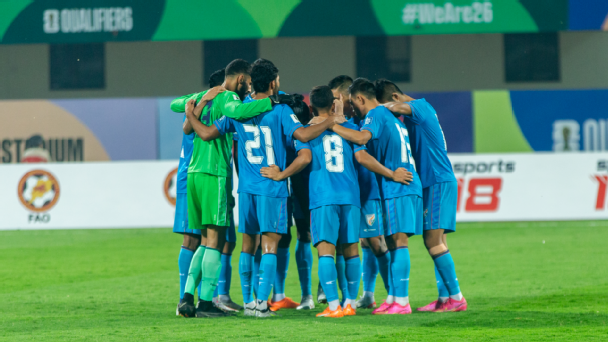“I don’t consider the Asian Cup an important tournament for us.”
Had a coach of India’s cricket team uttered such a phrase, you could guarantee the outrage that would follow. Yet, there was almost a quiet acceptance when Igor Stimac uttered these words after India suffered a 0-3 defeat against Qatar in their FIFA World Cup qualifier. Stimac had strolled into the press conference in a pensive, but slightly jocular mood, yet after a few tough questions, showered a hard dose of his perceived reality on the waiting journalists.
Not that there was much reality needed – Qatar were comfortably the better team against India and whatever pre-match expectations there were disappeared quicky. As much as Carlos Queiroz was insistent that this 3-0 win was far tougher than the 3-0 he had inflicted upon India with Iran in 2015, it was a lesson in the gap Indian football has to overcome.
It was almost a perfect irony that FIFA Global Development chief Arsene Wenger was in attendance, hours after launching an academy with AIFF President Kalyan Chaubey to shore up said gap. The task in front of them is a monumental one, especially given this very Qatar side were arguably the worst to feature at the 2022 FIFA World Cup. The task in front of Igor Stimac is just as massive too, with Qatar undoing the positivity surrounding the national side in 90 minutes.
A harsh lesson meted out, but does India have willing learners?
The starting lineup that Stimac named caused quite the stir, with the Croatian making five changes to the side that achieved a historic win away to Kuwait a few days prior.
Some were understandable — like Lallianzuala Chhangte starting after being the game-changer against Kuwait, while Anirudh Thapa coming in for Sahal Abdul Samad also explained by the former’s greater defensive nous. The duo were even part of India’s best moves going forward, but fluffed their lines.
The choice to pick Amrinder Singh in goal was more curious. It was explained away as a reward for him pushing Gurpreet Singh Sandhu to greater heights. Stimac said it was a credit to Amrinder, “to his discipline, to his patience, to his commitment, to his loyalty to the national team shirt.” Two questions remain, though. Why choose the biggest match of the Qualifiers to bench your #1? And how much credit Amrinder has left after his poor distribution and an error for Qatar’s second goal?
Subhashish Bose over Akash Mishra was also understandable, explained by the former’s defensive nous, but another curious one was Udanta Singh replacing Manvir Singh in the lineup. Stimac said the change had happened since Naorem Mahesh Singh was “going through some mental fatigue” after playing every minute for club and country. Udanta, though, effectively ended his chances of making the Asian Cup with a poor, disjointed performance – and Stimac confirmed as much after the game.
It was understandable that Stimac wanted to experiment – this being the last chance to do so ahead of India’s game against Australia in the 2024 AFC Asian Cup. Yet, if the tournament is ‘not important’, why bother? The Croatian might have earned answers to questions that were “haunting” him for a while, but that only underlines how his words about the Asian Cup was just him posturing.
The importance of the AFC Asian Cup
“Knowing that we’re not going to get enough time for Asian Cup, I don’t consider the Asian Cup such important tournament for us. I don’t want my players to get injured there – that’s all I’m going take care of. Because three games against such big opponents like Australia, Uzbekistan and Syria – we might do something well and we’re going to fight definitely, we’re going to leave everything on the pitch – but I’m not worried about that. I need to make sure that we get enough points in our group for the World Cup qualifiers, so we make sure that we have another five, six home games in the third round here. And that will be huge benefit for Indian football for the future, you know. So, let’s stop talking about Asian Cup.”
It’s important to present what Stimac said in full, because it’s hard to believe that a national team manager would even consider such a notion.
The AFC Asian Cup is when there will be greater eyeballs on India – a chance to woo new fans. There was plenty of celebration when achieving qualification for that tournament last year and a tough group is no excuse to wash your hands off of that.
Stimac’s assertion of 12-13 days of preparation not being enough barely holds water anymore – the team have shown they can switch to his style of play without much preparation. There isn’t even the pressure of expectation – Australia are out of India’s league, Uzbekistan have been on the rise of late (including an impressive 2-2 draw against Iran yesterday), and Syria can hold their own against India. Yet, hearts and minds can be won even in losing efforts – to dismiss a major tournament as “not a priority” is baffling.
Not to mention that Stimac focusing on the FIFA World Cup qualifiers… considering it is also the path to qualification for the 2027 AFC Asian Cup. This is the end goal – the big tournaments, the big stages – the very reason international football exists in the first place and why Stimac is employed.
“If the people which are around us want us to do better, they need to improve much more than us,” said Stimac at one point, and one wonders how kindly the federation will take to his blunt words, however much of a harsh truth it is.
Stimac has clarity on his squad
All posturing about the Asian Cup aside, the one “positive” as Stimac labelled it, was he’d achieved clarity on his squad for the tournament.
Stimac was glad to have Ishan Pandita back, noting he was getting back to his best but needed game-time. Rahul KP was “looking better and better every day.” The Croatian insisted on complimenting Rahul Bheke and Bose, with the two defenders writing themselves into the list of 23 that will play the Asian Cup.
“Apuia confirmed his position. Suresh confirmed his position.” Stimac seems to have the majority of his squad sorted out, with little room to manouver – the Croat even bristling at the notion of Jay Gupta (“one and a half good games”) and Parthib Gogoi being considered. The coach remains loyal to this group of players he has stuck with over the last couple of years, and it has fostered a team-spirit rarely seen before.
With no competitive action before India takes to the field against Australia in January, this was Stimac’s last shot at setting the narrative. India’s team-spirit remains one of its biggest strengths, even in the face of Qatar’s might, but with a manager who is prone to outbursts of cold, hard ‘reality’, that team-spirit might need to be safeguarded even more.



